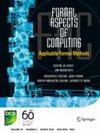Kaki: Efficient Concurrent Update Synthesis for SDN
IF 1.4
4区 计算机科学
Q3 COMPUTER SCIENCE, SOFTWARE ENGINEERING
引用次数: 0
Abstract
Modern computer networks based on the software-defined networking (SDN) paradigm are becoming increasingly complex and often require frequent configuration changes in order to react to traffic fluctuations. It is essential that forwarding policies are preserved not only before and after the configuration update but also at any moment during the inherently distributed execution of such an update. We present Kaki, a Petri game based tool for automatic synthesis of switch batches which can be updated in parallel without violating a given (regular) forwarding policy like waypointing or service chaining. Kaki guarantees to find the minimum number of concurrent batches and supports both splittable and nonsplittable flow forwarding. In order to achieve optimal performance, we introduce two novel optimisation techniques based on static analysis: decomposition into independent subproblems and identification of switches that can be collectively updated in the same batch. These techniques considerably improve the performance of our tool Kaki, relying on TAPAAL’s verification engine for Petri games as its backend. Experiments on a large benchmark of real networks from the Internet Topology Zoo database demonstrate that Kaki outperforms the state-of-the-art tools Netstack and FLIP. Kaki computes concurrent update synthesis significantly faster than Netstack and compared to FLIP, it provides shorter (and provably optimal) concurrent update sequences at similar runtimes.Kaki: SDN的高效并发更新综合
基于软件定义网络(SDN)范例的现代计算机网络正变得越来越复杂,并且经常需要频繁更改配置以应对流量波动。重要的是,不仅在配置更新之前和之后,而且在这种更新的固有分布式执行期间的任何时刻都要保留转发策略。我们提出了Kaki,一个基于Petri游戏的工具,用于自动合成开关批次,可以并行更新,而不会违反给定的(常规)转发策略,如路径指向或服务链。Kaki保证找到并发批的最小数量,并支持可分割和不可分割的流转发。为了获得最佳性能,我们引入了两种基于静态分析的新型优化技术:分解为独立的子问题和识别可以在同一批中集体更新的开关。这些技术极大地提高了我们的工具Kaki的性能,它依赖于TAPAAL的Petri游戏验证引擎作为后端。在来自Internet Topology Zoo数据库的大型真实网络基准测试中进行的实验表明,Kaki优于最先进的工具Netstack和FLIP。Kaki计算并发更新合成的速度比Netstack快得多,与FLIP相比,它在类似的运行时提供了更短的(并且可以证明是最优的)并发更新序列。
本文章由计算机程序翻译,如有差异,请以英文原文为准。
求助全文
约1分钟内获得全文
求助全文
来源期刊

Formal Aspects of Computing
工程技术-计算机:软件工程
CiteScore
3.30
自引率
0.00%
发文量
17
审稿时长
>12 weeks
期刊介绍:
This journal aims to publish contributions at the junction of theory and practice. The objective is to disseminate applicable research. Thus new theoretical contributions are welcome where they are motivated by potential application; applications of existing formalisms are of interest if they show something novel about the approach or application.
In particular, the scope of Formal Aspects of Computing includes:
well-founded notations for the description of systems;
verifiable design methods;
elucidation of fundamental computational concepts;
approaches to fault-tolerant design;
theorem-proving support;
state-exploration tools;
formal underpinning of widely used notations and methods;
formal approaches to requirements analysis.
 求助内容:
求助内容: 应助结果提醒方式:
应助结果提醒方式:


